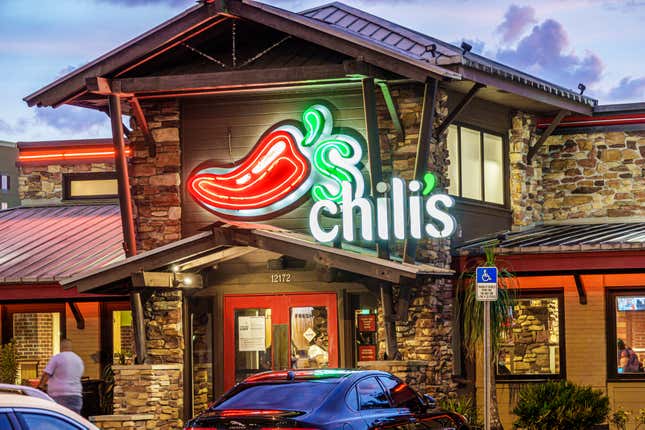
In This Story
Restaurant chain Chili’s was recently flooded with claims that it was closing all of its doors. It isn’t. But that doesn’t mean that Chili’s isn’t closing some locations. So far this year, the Brinker International-owned chain has closed three of its locations, one in Michigan, another in California, and a third in Louisiana.
The rumor that it was shuttering entirely, which started from a misleading blog article, spread as beloved chains across the country struggle against inflation and waning consumer demand.
Red Lobster has been forced to close over 50 of its locations. The world’s largest seafood company famous for its financially dubious “all you can eat shrimp” deal is preparing to file for bankruptcy. Its liquidator TAGeX Brands said it would auction off all that’s inside deserted locations to the highest bidder. To make matters worse, Red Lobster’s owner, Thai Union Group, said it wants to sell its remaining stake in the chain by the end of the year.
Applebee’s has found itself in a similar boat, but one that’s sinking even faster. Since 2017, the Dine Brands-owned chain has closed hundreds of restaurants, and the trend has only continued. During the first quarter, Applebee’s closed 5 locations. The chain is on track to close between 25 and 35 locations this year, according to its CEO John Peyton.
IHOP, another Dine Brands-owned chain, closed 9 restaurants during its first quarter. The company plans to close more IHOPs this year, Peyton said.
In April, Cracker Barrel closed four of its locations, two in California, one in Oregon, and another in South Carolina, in part due to underperformance. Notably, the chain raised its menu prices by 6.8%, according to its latest quarterly report. “As a standard course of business, we continually evaluate the performance of our stores, using various criteria to ensure we are meeting the needs of our guests and our business,” Cracker Barrel said in a statement, noting that “the decision to close a store is never taken lightly.”
TGIFriday’s is also celebrating less. At the top of the year, the chain said that it planned to close 36 of its underperforming locations in select markets across the U.S. The closures were part of its efforts to streamline operations, according to a company statement.
“By strengthening our franchise model and closing underperforming stores, we are creating an unprecedented opportunity for Fridays to drive forward its vision for the future,” said Ray Risley, TGI Fridays’ U.S. President and chief operating officer, in a statement.
Meanwhile, Denny’s does not appear to be phased by the more conscious consumer. America’s diner plans to close 10 to 20 locations in 2024, but is aiming to open up to 50 new restaurants, according to chief financial officer Robert Verostek.
Another chain not cooking under the pressure is Outback Steakhouse. It’s parent company Bloomin’ Brands told investors during a fourth quarter earnings call that it would be closing 41 of its underperforming locations, but has plans to open 40 to 45 news restaurants, making up the difference.
One restaurant thriving as lower income consumers pull back is Olive Garden. Owner Darden Restaurants Inc. said it opened 16 new locations during its most recent quarter, and according to CEO Rick Cardenas, the company has plans to open 50 to 55 new restaurants during the fiscal year.